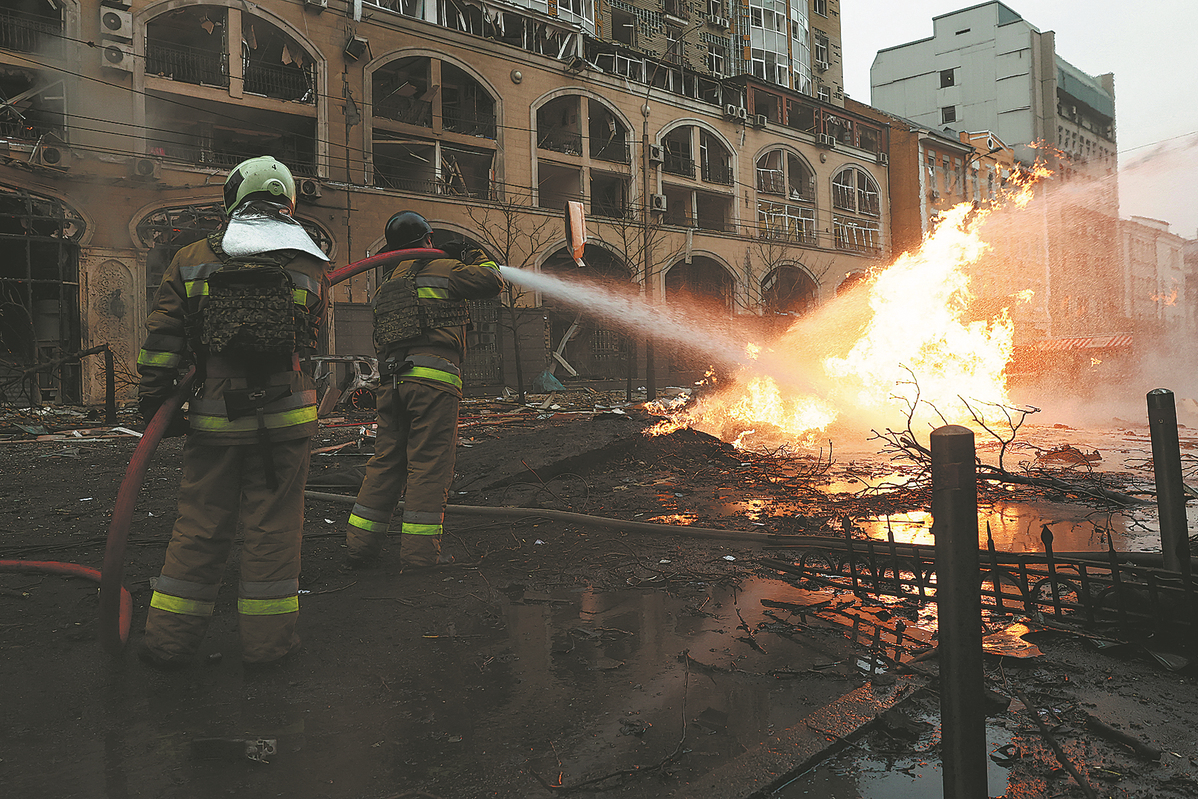Uncertainty clouds conclusion to conflict
Western support for Ukraine put into question as role of next US administration seen as key factor


Nuclear doctrine
Moscow responded swiftly and dramatically. Putin first announced a revision of Russia's nuclear doctrine. Moscow then used a nuclear-capable hypersonic Oreshnik missile against Ukraine and issued a statement asserting the right to strike military installations in states allowing Ukraine to use their weapons to attack Russia.
Putin recently indicated that Russia may use the Oreshnik again, including hitting "decision-making centers" in Kyiv, if Ukraine continues attacking Russia with long-range Western weapons. Putin also claimed that the Oreshnik is impossible to intercept and has destructive power comparable to that of a nuclear weapon even when fitted with a conventional warhead.
Military expert Vladislav Shurygin stated that the Oreshnik missile could bypass any existing missile defense system and destroy well-protected deep bunkers without using nuclear warheads.
The Oreshnik missile was launched at Yuzhmash, a Ukrainian plant that produced the world's largest strategic missiles of their kind.
"That was a demonstrative launch that will make the West reconsider its direct involvement in the Ukraine conflict," Russian military expert Viktor Litovkin noted.
However, Chinese experts believe that Moscow's threats and the use of a new missile do not suggest that escalation to nuclear use is likely. On the contrary, they see strong indications that it is unlikely.
In spite of tensions, Russia still maintains that the conflict is a special military operation rather than a full-scale war, said Zhang Hong, a researcher at the Institute of Russian, Eastern European and Central Asian Studies at the Chinese Academy of Social Sciences.
Zhang explained that Russia's goal in launching the operation is to ensure its own security interests, including demanding that Ukraine be demilitarized, and maintaining its traditional friendship with Ukraine, rather than allowing it to become a leading anti-Russian force.
Since the launch of Russia's special military operation in Ukraine, the Biden administration has been cautious in what it has permitted Kyiv to do with US-supplied arms.
For months, the US resisted calls to allow the use of long-range missiles against targets inside Russia.
The White House's decision to reverse the approach in mid-November indicated a high degree of confidence that Russia would not respond with any kind of nuclear weapons against Ukraine or any NATO state.
Wang Wen, executive dean of the Chongyang Institute for Financial Studies at Renmin University of China, does not think the US is likely to end the Russia-Ukraine conflict in the short term under Trump's leadership.
He noted that the conflict is long-term and neither Ukraine nor Russia is likely to have an agreement within the current conditions and borders.
Experts also said Trump and Republicans in Congress are unlikely to continue to provide Ukraine with the same levels of economic and military support as the country received from Democrats and the Biden administration. Ukraine has relied heavily on international aid to keep its economy afloat.
In a show of solidarity at a summit in Brussels recently with Zelensky, European Union leaders insisted that no decision can be taken about the future of war-ravaged Ukraine without its consent — or behind the backs of its partners in Europe.
"So now is not the time to speculate about different scenarios. Now is the time to strengthen Ukraine for all scenarios," said Antonio Costa, the president of the European Council.
There are also concerns that the comeback of Trump might result in a poor deal for Ukraine.
German Chancellor Olaf Scholz said it is important to "ensure long-term aid to Ukraine — it must be clear that we are prepared to enable support as long as it is needed".Air defense, artillery and ammunition are high on the list, he told reporters.
Luxembourg's Prime Minister Luc Frieden had a similar message.
"We need to stand with Ukraine, and every step … needs to be taken with Ukraine and in the presence of the European Union. The future of Ukraine is decided in Europe and not elsewhere," he said.
Dutch Prime Minister Dick Schoof underscored that only Ukraine can determine the conditions for talks, "and it is not for us to talk about that. At the moment, Ukraine has not yet indicated that they are prepared to do so".
In Ukraine, the 27-nation EU has provided at least as much support — more than 180 billion euros ($187 billion) since the conflict — as the US.
























